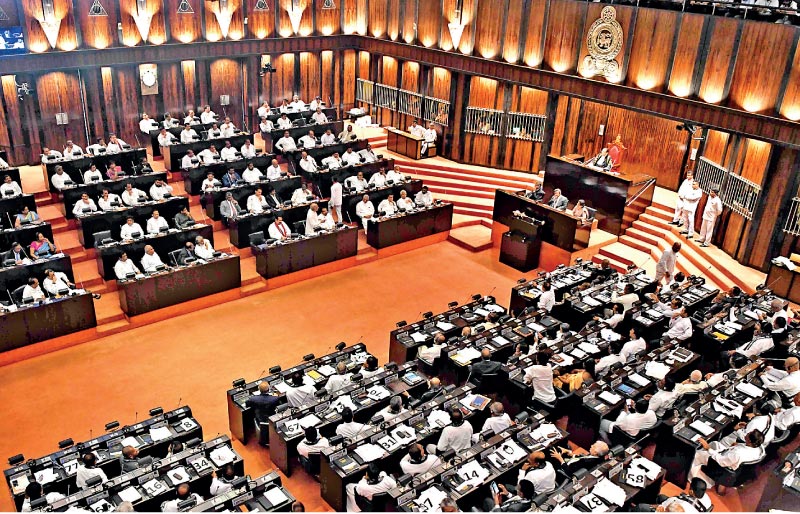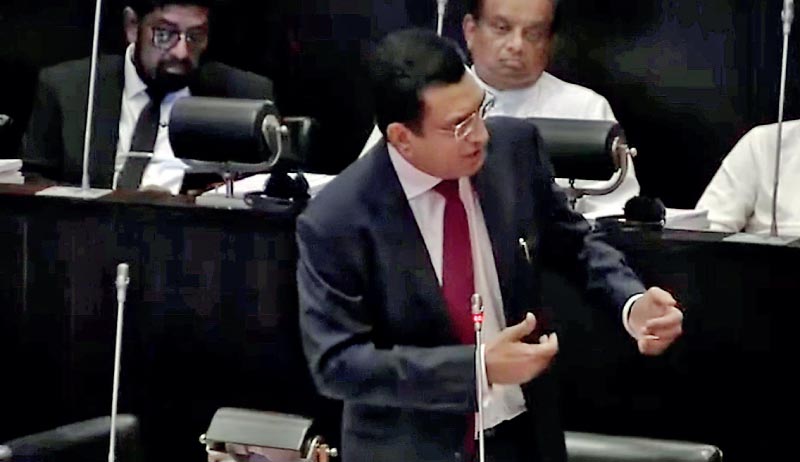Wednesday Feb 25, 2026
Wednesday Feb 25, 2026
Thursday, 5 May 2022 02:44 - - {{hitsCtrl.values.hits}}

|

Finance Minister Ali Sabry
Finance Minister Ali Sabry yesterday made a detailed presentation on the present state of the economy and suggested in his opinion the best way forward. Here are excerpts.
At this critical juncture of Sri Lanka’s post-independence history, I am addressing this august house today to deliver my first special statement as the Minister of Finance.
The country is battling with unprecedented socio-economic and political challenges. The root causes of these challenges go back to several decades of economic history although more recent developments have aggravated the situation into an acute crisis.
There are critical developments that need urgent attention. Inflation has risen to extremely high levels making the cost of living unbearable, foreign exchange reserves have depleted significantly, and the exchange rate has rapidly depreciated, all of which have contributed to the crisis. A foreign debt repayment standstill has been announced as an interim measure. There is a shortage of essential items, including fuel, LP gas, pharmaceuticals, and raw materials while power outages continue, and people are demonstrating on the streets against their economic hardships.
Fundamental macroeconomic weaknesses in the economy have been decades in the making. This includes fiscal instability, accumulated debt overhang, low productivity and persistent current account deficits. Recent shocks such as the COVID-19 pandemic and the Ukraine conflict have exposed these underlying weaknesses. However, we should also be humble enough to admit that this situation has occurred due to some of the misaligned and imprudent policies implemented in the recent past as well.
This is indeed a serious situation. I believe the time has come to follow a professional approach in resolving these issues rather than being swayed by ideological inclinations. I accept the fact that the aggravation of the issues was due to the delay in restoring fiscal and debt sustainability and failing to pre-emptively address the decline in foreign reserves. Sri Lanka should have focused on regaining capital market access by establishing a credible path of macroeconomic stabilisation, supported by institutions such as the IMF.
But now, rather than trying to find fault, it is important to identify the reasons for this situation and concentrate on the way forward. The public protests send the message that we need to be serious in providing professional and sustainable solutions. An important part of this is being transparent and forthright regarding the challenges ahead of us and the fact that there are no painless solutions to choose from.
Often times in Sri Lanka’s history, successive political actors have painted rosy pictures and made promises that lack realism and credibility. Every time there has been an attempt to establish long-term solutions, these are reversed in the next election cycle with a promise of short-term benefits and relief. We see today the adverse outcome of these stop-go policies – and the public has rejected this as reflected in the protests we see today.
It is time for Sri Lanka to establish a broad political consensus on the economic path forward for the country. An economic path underpinned by fiscal and monetary discipline, a focus on enhancement of productivity, and ensuring equitable outcomes by protecting the most vulnerable sections of our society.
We must understand the root cause of the issue, i.e. the unsustainable fiscal policies adopted by many successive governments. We should be humble enough to accept the fact that we as a country have lived beyond our means. Without proper checks and balances, all governments have spent much more than what they earned, of course with the approval of this august assembly, as the responsibility for public finances comes under the Parliament according to our Constitution. In my view, what is happening right now is that “we reap what we sow”.
The time has come to focus on sustainable solutions. The fundamentals of the remedies are quite straightforward. Manage expenditure within the framework of a reasonable revenue stream with a sustainable debt position, rather than placing the burden of a huge debt pile on generations to come.
But, to do that, we must make changes. Changes to the way we manage the fiscal operations and the entire economy. We should undertake reforms, to remove bottlenecks that hinder our economic progress. We must be futuristic and wise to take decisions in the name of the progress of the economy, progress of the country.
The Parliament must give priority to implement tax reforms to increase government revenue and rationalise expenditure whilst ensuring public investment in critical areas such as education, healthcare, and social protection. Macroeconomic policy must be tailored towards boosting national savings, channelling public and private investment towards productive sectors, whilst driving productivity and competitiveness in all aspects of the economy.
We need to take tough decisions in reforming State-owned business enterprises, encourage competitive market mechanisms where possible to achieve best outcomes at lowest cost to society. We must learn to harness the immense productive potential of market forces, whilst being fully aware of market failures and providing appropriate intervention to ensure just outcomes for society. We need to build up credible systems to improve public sector efficiency and productivity.
The decision to seek the assistance of IMF is important in this context. An IMF program will be a catalyst to undertake these much-needed reforms and will provide a signal to the rest of the world that we are serious in addressing our economic difficulties. But we must realise that the economic reform program we embark upon must be a program with Sri Lankan ownership. We must put forward a professional and analytically robust economic plan, where the IMF will also provide technical assistance and then endorse. Without that Sri Lankan ownership, and without broad consensus of the legislature, we would not succeed in providing permanent solutions for our longstanding economic issues.
Whilst we are facing deep economic challenges at present and our first priority is macroeconomic stabilisation, let us not lose sight of the immense potential Sri Lanka has as an Indian Ocean economy at the doorstep of the most dynamic economic growth centres in the world. We must continue to position ourselves to take advantage of these opportunities through appropriate engagement in regional and global economic value chains. Towards this end, we must invest in education, healthcare, clean energy, public transportation, social protection, and sustainable infrastructure.
In this process, the private sector needs to play a greater role in driving employment and growth. Sri Lanka needs to have a more globally competitive, export-oriented economy that is conducive to Foreign Direct Investments (FDI) with appropriate policies.
In so doing, we should take decisions underpinned by evidence-based research. I am in the process of establishing a Research and Analysis Division in my office at the Ministry of Finance. Very soon we will have a set of Advisors also in the Ministry of Finance. This will help us to promote new ideas and deliver a professional approach to economic policy making.
How did the situation escalate to the present crisis?
|
What triggered the recent crisis in Sri Lanka?
• However, political stability and support from all parties including the private sector are vital factors for us to implement this much needed reform agenda
|
Conclusion
Footnote:
1A note on “Fiscal Sector Performance” is given in Annex I, the Information Series Note No. 1 published on 28.04.2022 by the Ministry of Finance on the “Fiscal Sector: Present Situation and Way Forward” is given in Annex II and press release on “Recent Visit of the Sri Lankan Delegation to Washington DC to attend IMF/World Bank Spring Meetings” published on 28.04.2022 is given in Annex III for the information of the Members of the Parliament.